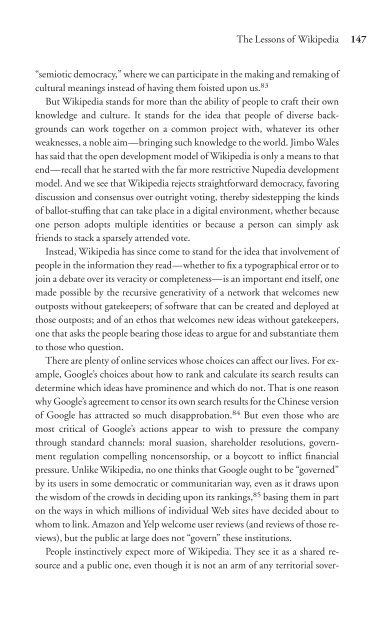Download - Future of the Internet â And how to stop it.
Download - Future of the Internet â And how to stop it.
Download - Future of the Internet â And how to stop it.
You also want an ePaper? Increase the reach of your titles
YUMPU automatically turns print PDFs into web optimized ePapers that Google loves.
The Lessons <strong>of</strong> Wikipedia 147<br />
“semiotic democracy,” where we can participate in <strong>the</strong> making and remaking <strong>of</strong><br />
cultural meanings instead <strong>of</strong> having <strong>the</strong>m foisted upon us. 83<br />
But Wikipedia stands for more than <strong>the</strong> abil<strong>it</strong>y <strong>of</strong> people <strong>to</strong> craft <strong>the</strong>ir own<br />
knowledge and culture. It stands for <strong>the</strong> idea that people <strong>of</strong> diverse backgrounds<br />
can work <strong>to</strong>ge<strong>the</strong>r on a common project w<strong>it</strong>h, whatever <strong>it</strong>s o<strong>the</strong>r<br />
weaknesses, a noble aim—bringing such knowledge <strong>to</strong> <strong>the</strong> world. Jimbo Wales<br />
has said that <strong>the</strong> open development model <strong>of</strong> Wikipedia is only a means <strong>to</strong> that<br />
end—recall that he started w<strong>it</strong>h <strong>the</strong> far more restrictive Nupedia development<br />
model. <strong>And</strong> we see that Wikipedia rejects straightforward democracy, favoring<br />
discussion and consensus over outright voting, <strong>the</strong>reby sidestepping <strong>the</strong> kinds<br />
<strong>of</strong> ballot-stuffing that can take place in a dig<strong>it</strong>al environment, whe<strong>the</strong>r because<br />
one person adopts multiple ident<strong>it</strong>ies or because a person can simply ask<br />
friends <strong>to</strong> stack a sparsely attended vote.<br />
Instead, Wikipedia has since come <strong>to</strong> stand for <strong>the</strong> idea that involvement <strong>of</strong><br />
people in <strong>the</strong> information <strong>the</strong>y read—whe<strong>the</strong>r <strong>to</strong> fix a typographical error or <strong>to</strong><br />
join a debate over <strong>it</strong>s verac<strong>it</strong>y or completeness—is an important end <strong>it</strong>self, one<br />
made possible by <strong>the</strong> recursive generativ<strong>it</strong>y <strong>of</strong> a network that welcomes new<br />
outposts w<strong>it</strong>hout gatekeepers; <strong>of</strong> s<strong>of</strong>tware that can be created and deployed at<br />
those outposts; and <strong>of</strong> an ethos that welcomes new ideas w<strong>it</strong>hout gatekeepers,<br />
one that asks <strong>the</strong> people bearing those ideas <strong>to</strong> argue for and substantiate <strong>the</strong>m<br />
<strong>to</strong> those who question.<br />
There are plenty <strong>of</strong> online services whose choices can affect our lives. For example,<br />
Google’s choices about <strong>how</strong> <strong>to</strong> rank and calculate <strong>it</strong>s search results can<br />
determine which ideas have prominence and which do not. That is one reason<br />
why Google’s agreement <strong>to</strong> censor <strong>it</strong>s own search results for <strong>the</strong> Chinese version<br />
<strong>of</strong> Google has attracted so much disapprobation. 84 But even those who are<br />
most cr<strong>it</strong>ical <strong>of</strong> Google’s actions appear <strong>to</strong> wish <strong>to</strong> pressure <strong>the</strong> company<br />
through standard channels: moral suasion, shareholder resolutions, government<br />
regulation compelling noncensorship, or a boycott <strong>to</strong> inflict financial<br />
pressure. Unlike Wikipedia, no one thinks that Google ought <strong>to</strong> be “governed”<br />
by <strong>it</strong>s users in some democratic or commun<strong>it</strong>arian way, even as <strong>it</strong> draws upon<br />
<strong>the</strong> wisdom <strong>of</strong> <strong>the</strong> crowds in deciding upon <strong>it</strong>s rankings, 85 basing <strong>the</strong>m in part<br />
on <strong>the</strong> ways in which millions <strong>of</strong> individual Web s<strong>it</strong>es have decided about <strong>to</strong><br />
whom <strong>to</strong> link. Amazon and Yelp welcome user reviews (and reviews <strong>of</strong> those reviews),<br />
but <strong>the</strong> public at large does not “govern” <strong>the</strong>se inst<strong>it</strong>utions.<br />
People instinctively expect more <strong>of</strong> Wikipedia. They see <strong>it</strong> as a shared resource<br />
and a public one, even though <strong>it</strong> is not an arm <strong>of</strong> any terri<strong>to</strong>rial sover-


